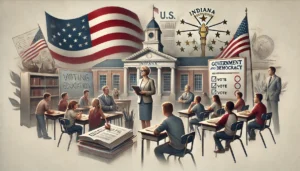As we step into 2025, the Indiana Council for the Social Studies is excited to share key predictions that promise to shape K-12 social studies and civics education in transformative ways. In a press release this week, Zachary Coté, Executive Director of Thinking Nation, encapsulated the urgency and potential of this year, noting, “Perhaps the best foundation we can set for our nation’s birthday in 2026 is to shift the paradigm of social studies and civic education in 2025.”
This year presents a unique opportunity to empower students and strengthen our democratic foundations. With advancements in technology, evolving pedagogies, and a renewed focus on civic engagement, we anticipate 2025 to be a pivotal year of transition and growth. Below, we highlight five significant trends that are poised to redefine the landscape of history and civics education.
Our 2025 PREDICTIONS FOR K-12 SOCIAL STUDIES AND CIVICS EDUCATION IN THE UNITED STATES
by Thinking Nation | Jan 06, 2025
Perhaps the best foundation we can set for our nation’s birthday in 2026 is to shift the paradigm of social studies and civic education in 2025,” said Thinking Nation Executive Director Zachary Coté. “In many ways, 2025 is a year of transition. Our predictions below illuminate how this historical moment can be used to empower students and strengthen our democratic resolve.
2025 Predictions for K-12 Social Studies Education
- Expanded Use of AI in the Classroom
AI will become a more prominent tool in classrooms, assisting educators with assessments and innovating student learning experiences, making history and civics more engaging and accessible. However, its ethical use will be critical to ensure it enhances, rather than replaces, humanistic teaching practices. - Democratization of Education
Efforts to make college-level education more accessible will grow, with schools and nonprofits expanding dual-enrollment opportunities, fostering greater equity in and accessibility to higher education. This will afford every high school student the opportunity to work with a college professor and will accelerate the trend to earn an associate’s degree in high school. - Growth in Community-Based Learning Fundamentally Shifts Pedagogy
Schools will increasingly connect with local resources—museums, cultural institutions, and community history—to create immersive, placed-based learning experiences for students. This approach will shift teaching methods in a manner that addresses bipartisan priorities and fosters a deeper connection to local and national narratives. - A Civic Renaissance in Education
Curricula emphasizing critical thinking and historical analysis will gain traction, signaling a shift away from rote learning to a deeper exploration of history and civics as disciplines essential to the success of our modern democracy. The trend of teaching students to think like historians will gain momentum, with a focus on primary source analysis, contextualization, and evidence-based argumentation. - A Shift Toward Global Civic Education
Recognizing the interconnectedness of the modern world, educators will increasingly integrate global studies into civics and social studies curricula. This approach will emphasize pluralism, cross-cultural understanding, international relations, and the role of the United States in a broader global context, preparing students to navigate and contribute to an interdependent and diverse world.
As Thinking Nation prepares to celebrate its five-year anniversary in 2025, the organization expects philanthropic and public funding to increase in order to make these predictions a reality. This important financial support will help prioritize impactful initiatives that foster civic engagement, counter polarization, and prepare students to strengthen democracy.




